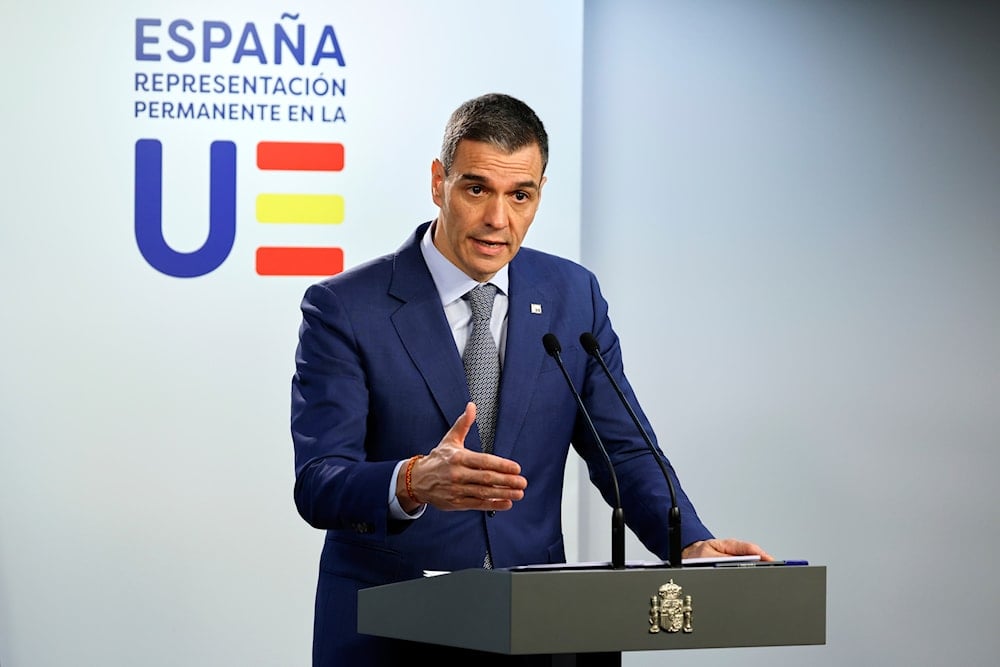Spain PM visits China, Vietnam amid US tariff crisis
Spanish Prime Minister Pedro Sanchez embarks on a visit to China and Vietnam this week, seeking new market opportunities amid the global disruption caused by US tariffs.
-
 Spain's Prime Minister Pedro Sanchez speaks during a media conference at the end of an EU summit in Brussels, on Thursday, March 20, 2025.. (AP)
Spain's Prime Minister Pedro Sanchez speaks during a media conference at the end of an EU summit in Brussels, on Thursday, March 20, 2025.. (AP)
Spanish Prime Minister Pedro Sanchez is aiming to explore new market opportunities during his visit to China and Vietnam this week, following the sweeping tariffs imposed by US President Donald Trump. The trip comes at a time when the European Union is reevaluating its global trading relationships amid the turmoil triggered by Trump’s new import duties, which have caused significant disruption in global markets.
Sanchez will first visit Hanoi on Wednesday for talks with Vietnam’s top leader, To Lam, coinciding with the start of Trump’s 20% tariffs on EU products. He will then head to Ho Chi Minh City to meet with business leaders before traveling to China for the third time in just over two years, where he plans to meet President Xi Jinping and Chinese investors on Friday.
The wider context
China and Vietnam currently have a significant trade surplus with Spain. Last week, Trump announced that he would impose a 34% tariff on China in addition to a 20% levy, and on Monday, he threatened to escalate tariffs to 50% from Wednesday if China did not withdraw its retaliatory measures. Vietnam, which will be hit with a 46% tariff, is also a key focus of Sanchez’s visit.
The rollout of US #tariffs against numerous countries, allies and foes, has sent shockwaves through the world.
— Al Mayadeen English (@MayadeenEnglish) April 3, 2025
On April 2nd, US President Donald #Trump announced tariffs that would affect approximately 60 countries.
Here's how some of these countries reacted to America's… pic.twitter.com/8rTm5Cr6F0
Sanchez had previously diverged from the EU’s stance during his last trip to China in September 2024, calling for the EU to reconsider plans to impose high tariffs on Chinese electric cars. He argued for a "fair trade order," but the EU emphasized these tariffs were necessary to protect European producers from state-backed Chinese firms.
“Inés Arco, an Asia specialist at the Barcelona Centre for International Affairs, noted that Sanchez "has tried to present himself as a bridge between Brussels and China and to be one of the voices calling for pragmatism." However, Spain’s conservative opposition, including Alberto Nunez Feijoo, leader of the Popular Party, criticized Sanchez for acting independently, accusing him of mistakenly trying to shift from reliance on the US to China too quickly.
Sanchez seeks to balance trade and boost investments in China
The EU, however, has recently signaled a desire for smoother ties with Beijing. EU chief Ursula von der Leyen has called for “constructive engagement with China,” and trade commissioner Maros Sefcovic recently visited China to "promote a more balanced and cooperative trade relationship."
Sanchez’s primary objective is to reduce Spain’s trade imbalance with China. Spain imports around 45 billion euros worth of goods from China each year, but only exports about 7.4 billion euros.
Miguel Otero from the Elcano Royal Institute stated that the trip’s “clear objective” is to increase Spain’s exports to China. Sanchez also hopes to attract more green tech investment, with Chinese carmaker Chery planning to open its first European electric vehicle factory in Barcelona. Additionally, BYD, another Chinese automaker, is considering investing in Europe, and Spain could be a potential location.
Spanish Economy Minister Carlos Cuerpo emphasized that Spain is looking to "negotiate agreements" with China to open up markets while ensuring "our companies, our industries play on a level playing field."
Read more: Trump warns China of more tariffs, Beijing decries 'economic bullying'

 4 Min Read
4 Min Read








